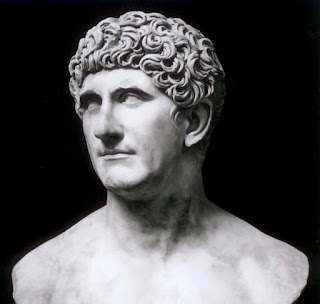These two men separated by so many years and so many achievements and skills, do have one thing in remarkably similar in common. They both loved their horse. Bucephalus, the horse that carried Alexander to the ends of the earth and Incitatus, the favourite horse of Caligula Gaius Caesar who had its own palace.
But which horse can rightly go down as the most revered and celebrated horse of ancient history?
Bucephalus
"The horse was greatly disturbed by the sight of his own shadow falling in front of him and dancing about. And after he had calmed the horse a little in this way, and had stroked him with his hand, when he saw that he was full of spirit and courage, he quietly cast aside his mantle and with a light spring safely bestrode him"
Bucephalus served as Alexanders primary steed in numerous battles, especially in the horses youth. In the famous mosaic of Alexander at the Battle of the Issus, it is assumed that the horse shown is Bucephalus. Carrying Alexander from Macedonia to Egypt, from Egypt to Babylon and from there always further east until they reached the Hindu Kush and the Battle of the Hydaspes.
 |
| Battle of Issus |
This seems somewhat convenient and it is not specifically stated if Bucephalus was the horse that Alexander rode in the battle. What is known is that Bucephalus died shortly after and was honoured with a city named after him in the region. The city of Alexandria Bucephalus was located on the Indus river and was an important centre for many years and is shown on later maps and in texts.
Incitatus
"He used to send his soldiers on the day before the games and order silence in the neighbourhood, to prevent the horse Incitatus from being disturbed"
Incitatus was the favourite horse of the Roman Emperor Gaius Caligula Caesar. In Suetonius's Lives of the Twelve Caesars, he tells us that Incitatus had a marble stable in which to live, with an ivory manger, purple blackets (the colour of imperial power) and a collar decorated with precious stones. Dio Cassius adds that this horse was fed oats with gold flakes mixed in.
The greatest story about Incitatus is that Gaius Caligula intended to make his favourite horse the Consul of Rome. Consul was the highest position in the government, available to members of the Senate. Incitatus would invite other members of the Senate to fine with him in his "house" where servants would entertain and serve the guests.
However, it is often assumed that the story regarding Incinatus being raised to the position of Consul is a fabrication or a later exaggeration by Suetonius in his attempt to highlight Gaius Caligula as a bad emperor. Equally there is the suggestion that the story while true was a big joke by Gaius Caligula at the expense of the Senate that he disdained. A satire on their uselessness and inabilities.
The question of which horse is greater or more significant to history is difficult to rate. How do you compare a horse that carried Alexander to so many victories, to one that finally highlighted just how impotent the Senate had become in the Roman Empire? Arguably Bucephalus did more physical work, literally carrying Alexander the length of the known world. However as a piece of politcal satire it is Incitatus who holds the greater sway.
In the end I'll let you decide which horse is the more important. But if you need more to help you finally choose; Bucephalus means Ox Head in Greek, while Incitatus is Latin for Swift...
Thanks for Reading
James











